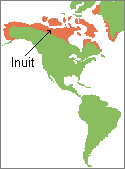Actual mating patterns may be different
from the cultural ideal. For instance, in the more traditional
regions of Spain, Portugal, and Latin America, men
generally strive to be machos-- that is, confident, strong,
dignified, brave men. Machos
![]() should be overtly masculine and sexually active. They are expected to have
a wife with many children and possibly one or more mistresses. Men are
usually assumed to be adulterous by nature. Women, in contrast, are expected to be
passive in responding to the demands of their husbands and to have sexual
intercourse only with them and only when they are married. They are to
emulate the Virgin Mary in being chaste. As a result, this female
counterpart to machismo
should be overtly masculine and sexually active. They are expected to have
a wife with many children and possibly one or more mistresses. Men are
usually assumed to be adulterous by nature. Women, in contrast, are expected to be
passive in responding to the demands of their husbands and to have sexual
intercourse only with them and only when they are married. They are to
emulate the Virgin Mary in being chaste. As a result, this female
counterpart to machismo
![]() has been referred to as marianismo
has been referred to as marianismo
![]() (from Maria or Mary).
(from Maria or Mary).
 |
 |
|
|
Spanish ideals of machismo and marianismo |
In reality, both men and women deviate
from these ideals. However, women are usually more often punished for it.
Especially when there is a pregnancy outside of wedlock.
Androgynous
![]() men may only suffer ridicule for their failure to achieve the difficult
goals of machismo. This sort of double standard over sexual fidelity is
common in male dominated cultures.
men may only suffer ridicule for their failure to achieve the difficult
goals of machismo. This sort of double standard over sexual fidelity is
common in male dominated cultures.
All societies have rules to regulate marriage partner selection. Even when individuals are left free to make their own choices, there are still rules that limit and narrow the range of potential marital partners. These rules can be explicit or implicit. In North America, the important social constraints are mostly implicit. Family and friends usually encourage marriage within the same social class, religion, and ethnic/racial group. Explicit rules are in the form of formal laws. Typically in North America, these only require that a mate be of the opposite gender, over the age of consent, willing, alive, and not a close family member.
 |
|
single, independent
women |
In small-scale societies, most people are expected to get married. Unmarried adults are usually pitied if they are women and distrusted if they are men. Cities in large-scale societies are more likely to provide an acceptable status for unmarried adults. Such societies are also likely to be somewhat more tolerant of deviant dress and uncommon life styles. For instance, the two young urban European women shown here have the freedom to remain unmarried as well as socially and financially independent.
Marriage in all societies involves acceptance of an agreement, either written or verbal. Most often, this includes four categories of privileges, rights, and obligations of the marrying couple:
|
1) |
agreeing to
exclusive sexual access |
The right to have children is not the same as sexual access, though it may initially seem so. It means the right to socially recognized descendants. In many cultures, biological paternity is often less important than socially acknowledged paternity. In any case, the prolonged dependency of human children requires a long term agreement to share in their upbringing.
The acceptance of a division of labor based primarily on gender involves sharing the fruits of each other's work. In most societies, this results in women performing the routine domestic household tasks such as cleaning and food preparation as well as child rearing. Men are usually responsible for the periodic household tasks requiring upper body strength and for work outside of the home. This traditional division of labor has been popularly interpreted in the Western World as exploitation of women. However, that may be a hasty conclusion. Likewise, it would be equally premature to see it as exploitation of men. In depth, objective studies of marriage and family life in other cultures often show that the reality is far more complex with mutual benefits derived by both men and women.
The agreement to an extension of kinship bonds is a right to have long term social ties with in-laws that can provide security against economic and social misfortune. In small-scale societies, marriage is usually the best means of securing and assuring alliances between unrelated families.
Limiting the Number of
Births
Despite the common desire to have children, most societies try to limit or at least space births to allow those babies that are here to survive and have economic advantages. Common methods of preventing pregnancy even in small isolated societies with low levels of technology include:
 |
 |
||
Mother and child |
|||
Post partum sex taboos are surprisingly
long in some societies. Among the Indians of the North American Plains husbands and wives traditionally were expected to
abstain from sexual intercourse for up to four years after each birth. Among the Dani
![]() and some neighboring societies in New Guinea, the abstention was for five years.
and some neighboring societies in New Guinea, the abstention was for five years.
|
|
|
North American couple |
North American and European cultures also advocate post partum sex taboos "for the health of the mother." Regardless of the rationale, however, the net effect is the same. Births are spaced farther apart. In societies with long post partum sex taboos, it is common for husbands to be relatively free to have sex with other women or men during the required period of marital sexual prohibition. This is not the case in Europe and North America today.
 |
|
As a last resort, population may be controlled by
infanticide
![]() (that is, killing young children). In the past, the Inuit
(that is, killing young children). In the past, the Inuit
![]() , or
Eskimo
, or
Eskimo
![]() , of the North
American polar regions were occasionally forced by winter starvation to kill the
individual within the family who had the least potential for bringing in food. That
was usually the youngest daughter. She died so that the others could live.
The Inuit took
no pleasure in killing their baby girls. They also were well aware that this
selective female infanticide had long term negative effects in their society. It
ultimately reduced the number of marriageable women, resulting in increased competition
among men for mates. This has been suggested as a leading cause of relatively high
murder rates for Inuit men in earlier times.
, of the North
American polar regions were occasionally forced by winter starvation to kill the
individual within the family who had the least potential for bringing in food. That
was usually the youngest daughter. She died so that the others could live.
The Inuit took
no pleasure in killing their baby girls. They also were well aware that this
selective female infanticide had long term negative effects in their society. It
ultimately reduced the number of marriageable women, resulting in increased competition
among men for mates. This has been suggested as a leading cause of relatively high
murder rates for Inuit men in earlier times.
Infanticide in response to severe economic hardships has not been unique to the Inuit. However, no society considers it to be a desirable practice. It occurs where circumstances leave desperate parents with little alternative.
 |
|
| "Surplus" men lost in warfare | |
Female infanticide reportedly also has occurred in the People's Republic of China in response to the official one child per family policy instituted in 1979 and to the high cultural value placed on male offspring. Many female fetuses allegedly have been selectively aborted and female newborn infants have been killed secretly or abandoned so that parents can have another chance at producing a male heir. The net effect of this for China now is a relative scarcity of marriageable women, which allows them to demand more from prospective husbands. Another consequence has been a high number of Chinese girl infants that are adopted by North Americans and people in other Western nations.
Warfare also can have a
limiting effect on birth frequency. The removal of men in their breeding years from
society can reduce the number of pregnancies, especially if monogamy
![]() is the rule and extramarital sexual intercourse is rare. Warfare also
has the harsh effect of killing "surplus people." However, it is
doubtful that any society went to war with birth control and
population reduction as an intended goal.
is the rule and extramarital sexual intercourse is rare. Warfare also
has the harsh effect of killing "surplus people." However, it is
doubtful that any society went to war with birth control and
population reduction as an intended goal.
